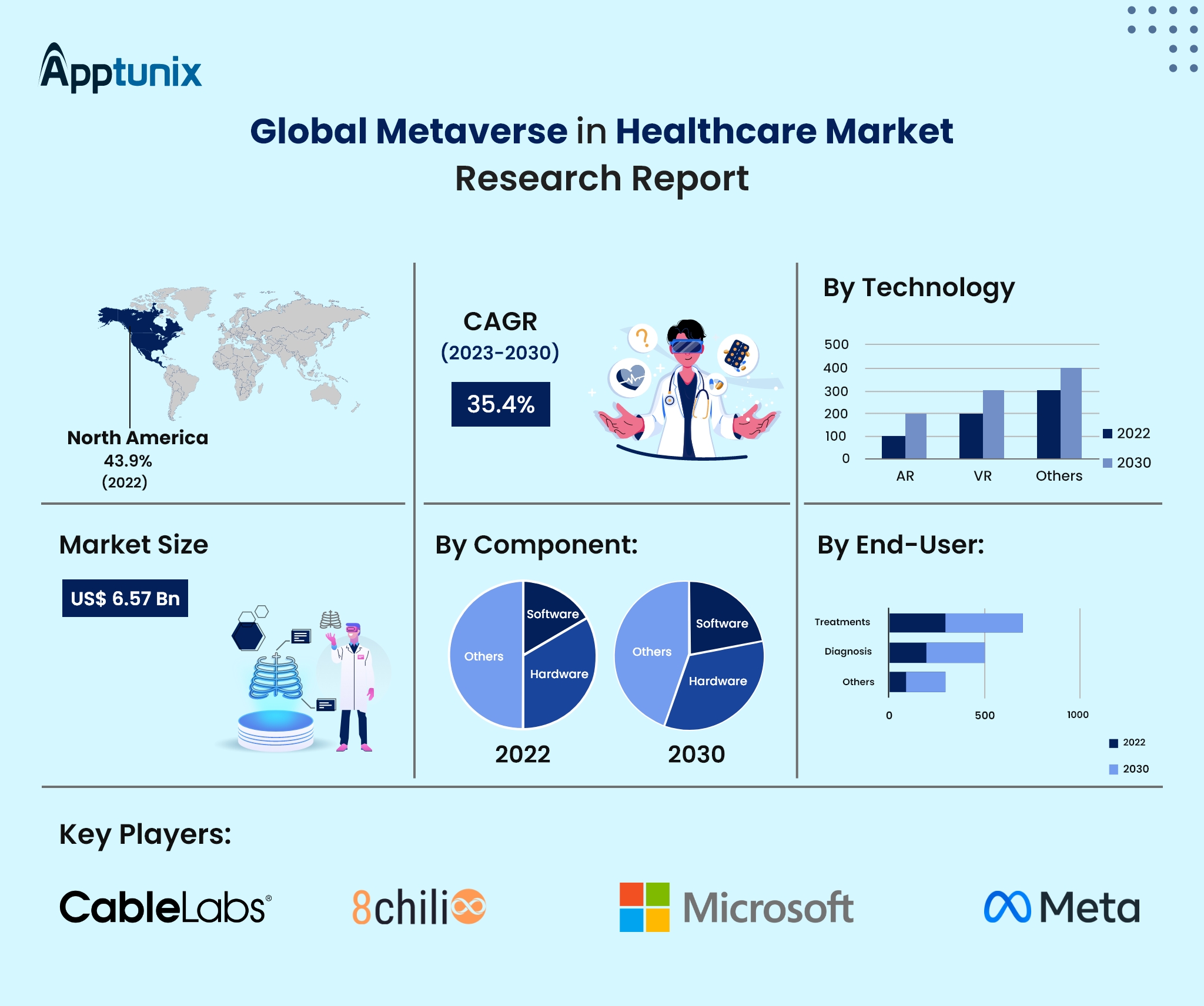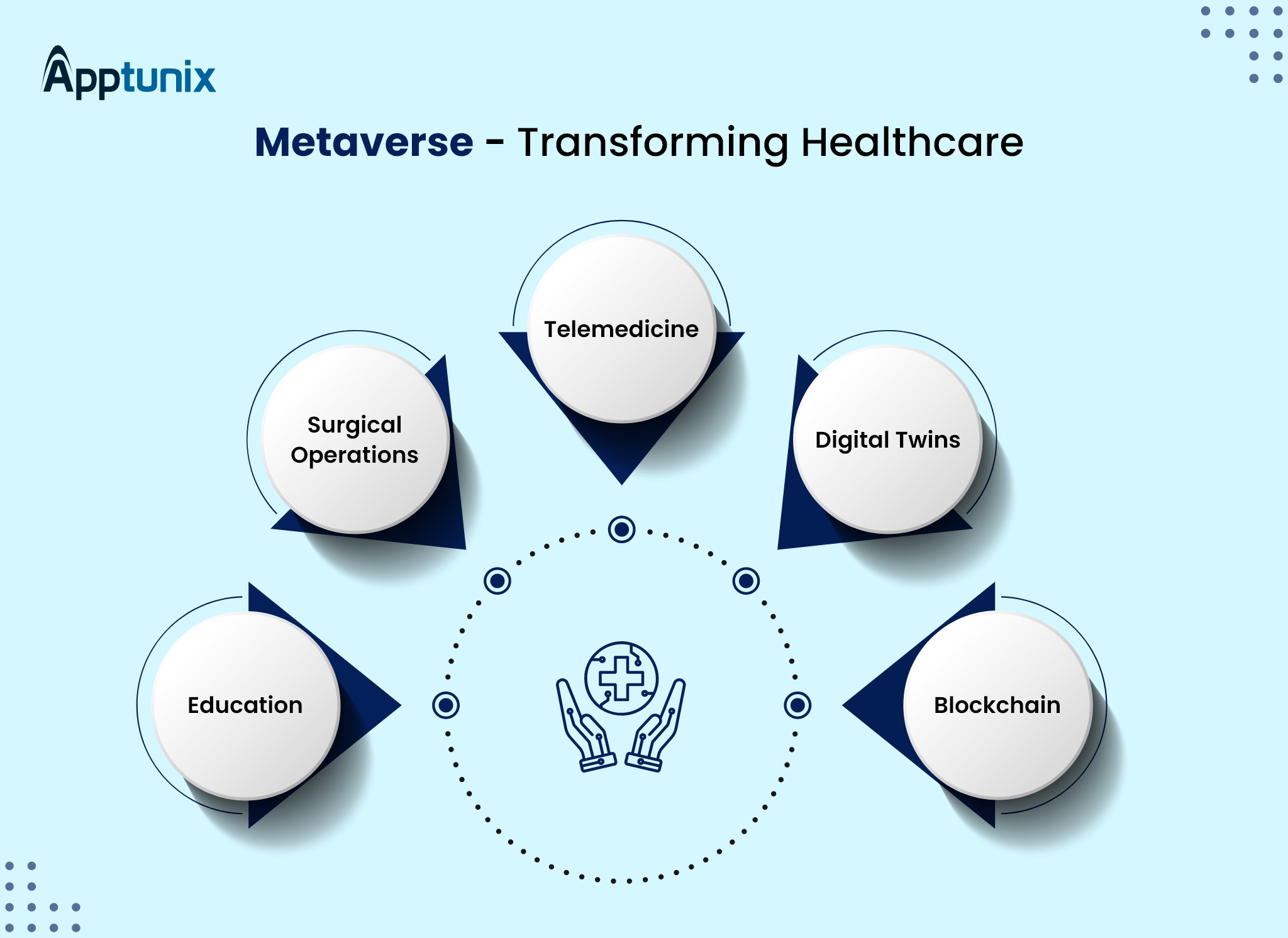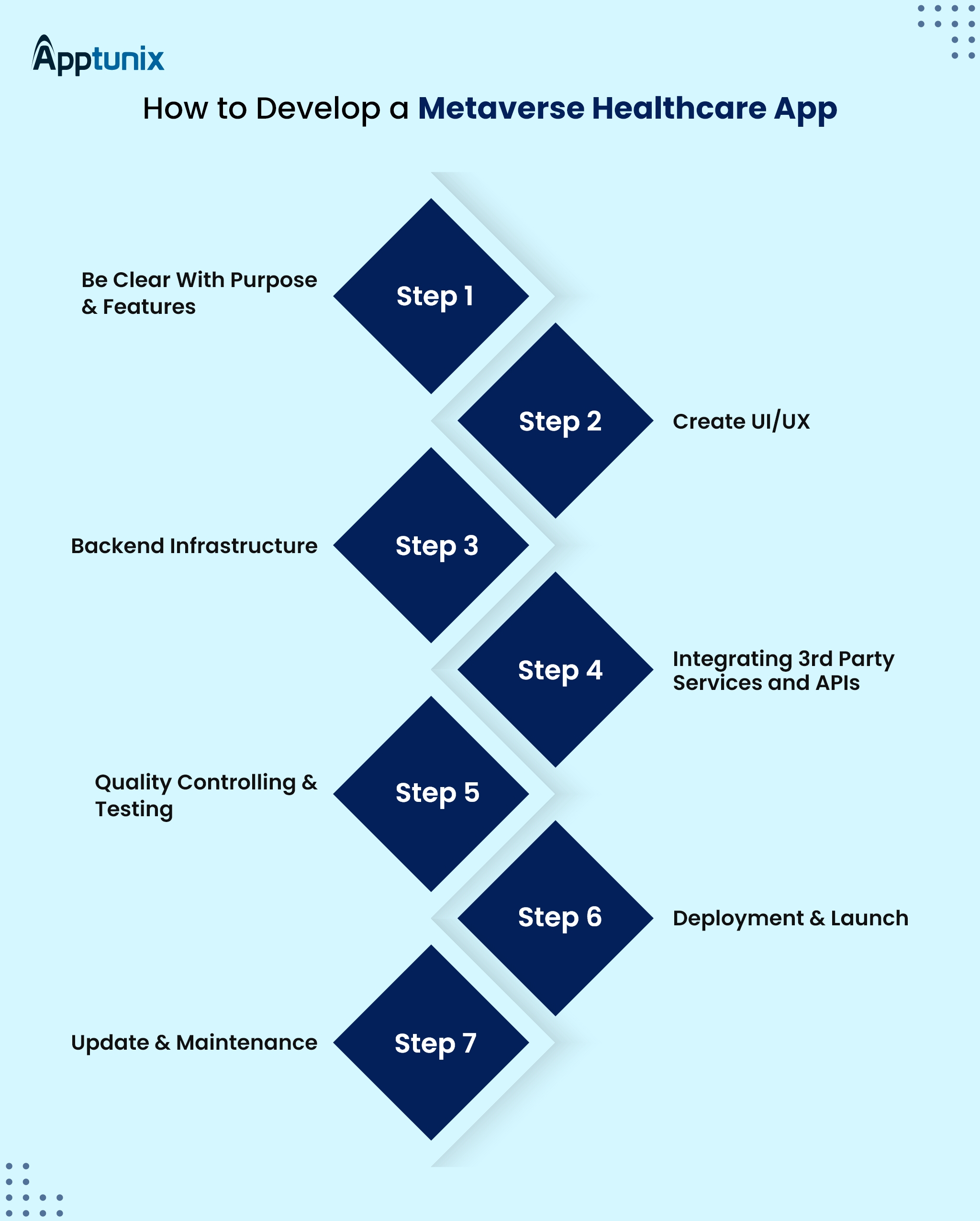Don't miss the chance to work with top 1% of developers.
Sign Up Now and Get FREE CTO-level Consultation.
Confused about your business model?
Request a FREE Business Plan.
Metaverse Healthcare App Development – A Boon for Investors
Table of contents

After invoking the gaming & entertainment industry metaverse is spurring a transformation in healthcare development. Although this technology is still in its early development stages, there are many areas in the healthcare sector that are reaping its benefits.
The question is why not when state-of-the-art technologies like Artificial Intelligence (AI), Virtual Reality (VR), Augmented Reality (AR), Mixed Reality (MR), Web 3.0, cloud, edge & quantum computing, Internet of medical devices, and so on are working in a combination.
Moreover, according to a recent study, the global metaverse in the healthcare market size was valued at 6.57 billion in the year 2022 with North America dominating the market share (43.9%). This is expected to rise to 71.6 billion by 2030 with a CAGR of 35.4% (2023-2031).

Metaverse in Healthcare - Creating Value for Companies
Whether we talk about diagnostics and therapeutic applications, medical training, meetings, conferences, or so on, organizations from around the world have utilized XR (Extended Reality) a lot. Now they are shifting to the metaverse which is an amalgamation of all these technologies in order to
- Improve access to care by bringing together patients and providers without any restrictions to the location.
- Enhance the accuracy of diagnostics and surgery.
- Minimize costs in care delivery, data management, medical training, etc.
- Open doors to storage, sharing, & access to data related to patients, providers, and claims.
- Elevate the experience of patients and insurance plan members apart from diversifying revenues through new offerings.
- Bring down operational costs by streamlining recruiting, learning payment, development, and other such processes.
How Can the Metaverse Transform the Healthcare Industry?
So you must have got some idea of how the metaverse can prove to be a game changer in the healthcare sector. Let’s now dig deeper to understand in detail the benefits of a metaverse in the healthcare industry.

Education
Both AR and VR (components of the metaverse) are capable of bringing large-scale technological transformation. If we consider the education sector, medical education & training will experience massive change. Where AR will allow students to undertake hands-on learning through the use of medical instruments, perform surgeries, visualize, and practice advanced medical technologies, VR will provide a virtual world of surgical theaters and rooms.
Surgical Operations
Whether we talk about AR, VR, or AI, all these technologies are used extensively in universities and educational institutions to facilitate students with a 3D view of patients’ bodies in order to train them for various medical-surgical procedures.
Moreover, VR in combination with AI can ease the process of complicated surgeries. In addition to this, the metaverse can offer a greater degree of precision and accuracy. This is going to elevate the success rate by treating complex surgeries like the removal of cancerous or tumor cells, performing other surgeries related to spinal, and so on.
Telemedicine
We all have seen the inability of the 2D healthcare systems and solutions during the pandemic (COVID-19). A reason why telemedicine has risen to 95% post-pandemic. And why not when it is capable of delivering remote therapy as well as treatment to patients present in any corner of the world (provided they have internet connectivity in their region)?
If we talk about the role of the metaverse, both VR and AR can benefit patients, especially in those scenarios where they can develop anxiety. Metaverse can provide a safe environment to both patients and healthcare providers thus making the process of treatment as well as recovery easier. This cutting-edge technology can enhance telemedicine visits through a virtual office that allows patients and doctors to meet in an advanced 3D facility and reap the benefits.
Digital Twins
There is a larger number of medical tech giants like Siemens Healthineers, GE Healthcare, and so on that are in the process of adopting Digital Twins technology (virtual representation of an object or system as a whole in the digital world like metaverse). In simple words, digital twins are all about the virtual representation of a certain object from the real world and time in order to analyze and study it for making appropriate decisions.
In healthcare, this can be anything ranging from medical devices to patients. If we consider its importance in the future, digital twins in coordination with the metaverse are projected to be used as “test dummy technology” that will be crucial for patients, researchers, scientists, drug developers, or other medical professionals. In simple words, it can help to understand and predict the fast recovery of a patient either from surgery or some other disease.
Blockchain
Blockchain is one of the significant components of the metaverse that can revolutionize the healthcare sector. Whether it’s the administration or security of crucial healthcare-related data or information, blockchain offers both. Now as blockchain is a component of the metaverse technology it can offer a solid shield against vulnerable data thefts and other ethical practices.
Apart from this, whether it’s about making regulations, taking care of conveyance, making installments/ payment processes transparent, and so on, metaverse can handle it quite well.

Metaverse Healthcare App Development - Making a First Move
Although the metaverse is a new technology, it has earned a lot of familiarity within a short span. As a result, it is not difficult to get started with. All you need is a solid healthcare application development process from a leading metaverse software development company well known for offering quality services. So let’s go through the development process step-by-step.

Step 1: Be Clear With Purpose & Features
It is of no use to begin the development process without being clear about the purpose as well as the features you want in your metaverse healthcare application. This includes thorough market research along with the target audience. This way you will be able to offer better solutions to the problems your target audience is facing.
Step 2: Create UI/UX
No matter how good your app is, if it fails to impress the audience in terms of intuitiveness and user-friendliness your app will lose ground in the cut-throat market competition. Thus it is essential to make a simple and easy-to-use user interface. Then it doesn’t matter whether it’s about paying attention to layout, color palette, typography, or some other essential elements.
Step 3: Backend Infrastructure
Database, Server, & API (Application Programming Interface) plays a crucial role. Where the database should be able to store users’ health-related information safely and efficiently, the server must be capable enough to handle large traffic and offer consistent performance even during peak traffic hours. In addition to this, the API must allow the app and its infrastructure to communicate efficiently in real time.
Step 4: Integrating 3rd Party Services and APIs
Healthcare apps may require interaction with various 3rd party services and APIs like Electronic Health Record (EHR) systems, healthcare providers, insurance organizations, and so on. This all demands unique design and development of interfaces that allows the app to communicate effectively & securely with various other systems. So this is where one needs to focus on.
Step 5: Quality Controlling & Testing
This is one of the crucial steps in healthcare app development that entails running various tests to make sure the app is clearing the benchmarks in terms of operation, usability, and security. Quality assurance is essential to verify that the app is ready to move into the hands of audiences.
Step 6: Deployment & Launch
Once the testing phase is completed the app is installed on a secure and reliable platform that is capable enough to handle anticipated traffic load. While in the launch phase, various marketing techniques & channels are used to reach the maximum audience.
Step 7: Update & Maintenance
Needless to say, the app must be updated and maintained regularly in order to offer a seamless user experience. It also helps to beat the market competition.
Also Read: How Much Does It Cost to Develop a Metaverse in 2023
Ride the Trending Wagon Wheel of Metaverse Healthcare App Development With Apptunix
Apptunix has earned a solid reputation as a top Metaverse healthcare app development company. Whether it’s metaverse app development, metaverse 3D space development, metaverse digital twin development, metaverse marketplace development, metaverse consulting, metaverse 3D avatar development, metaverse gaming space development, metaverse integration services, and so on, Apptunix offers all under a single roof. Then why miss an opportunity to be a part of the metaverse revolution?

Frequently Asked Questions(FAQs)
Q 1.How Much Does It Cost to Develop a Metaverse Healthcare App?
The average cost to build a Metaverse healthcare app ranges from 30,000 USD to 300,000 USD depending upon your specific business requirements and the features you want to add to your Metaverse healthcare app.
Q 2.How Much Time Does It Take to Develop a Metaverse Healthcare App?
It generally takes about 5-6 months to build a metaverse healthcare app. This time can be even more or less depending upon your business requirements as well as the features you want in your app.
Q 3.What is the Future of the Metaverse in the Pharma Industry?
Pharma industries spend a lot of time & money on Research & Development (R&D). The metaverse brings new possibilities in the form of digital twins that can drastically reduce time and cost.
Q 4.What are the Benefits of a Metaverse in Healthcare?
Metaverse has a lot of benefits in the healthcare industry. Some of the major sectors in healthcare where metaverse can prove to be a boon are
- Training & Education
- Fitness & Wellness
- Teleconsultation
- Collaborative Surgery
- Digital Twins
Rate this article!
Join 60,000+ Subscribers
Get the weekly updates on the newest brand stories, business models and technology right in your inbox.

With about 7 years of experience (Technical & SEO Writing) and a solid technical background (Master of Technology – E.C.E with Wireless Communication as specialization), he has worked both as a freelancer and on a regular basis for prestigious IT organizations across the globe. Whether it’s Blockchain, Metaverse, Artificial Intelligence (AI) & Neural Networks, Machine Learning (ML), Internet of Things (IoT), Cyber Security, Cloud Computing, 5G Technology, or some other trending technologies he has written whitepapers, eGuides, blogs, technical documentation, guest posts, and so on for almost all. Here at Apptunix, he is generating B2B content.

Telemedicine 2.0 - A Comprehensive Guide On What Healthcare Providers Need To Know?
Discover how the latest advancements like Artificial Intelligence in telemedicine are reshaping patient care. This comprehensive resource offers insights into the key trends and innovations driving this shift, providing valuable knowledge for healthcare professionals looking to stay ahead.
Download Now!

















